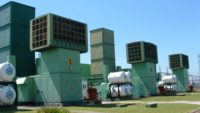
Although a World Bank inspection panel has criticized on environmental and other grounds a mammoth coal-fired powerplant under construction in South Africa, the project will proceed and the bank will continue to fund it—but with bank and government officials keeping a close eye on the project’s environmental impact. As work advances, there will be additional World Bank and South Africa government monitoring of the project’s effects on local water supply, air quality and public infrastructure through 2022, seven years beyond its scheduled completion date.
When finished, the 4,800-megawatt Medupi powerplant, being developed by Eskom, South Africa’s power generator and distributor, would be the fourth-largest coal-fired powerplant in the world and the largest such facility to be dry-cooled. It is located about 350 kilometers north of Johannesburg in Lephalale, Limpopo Province. Plans call for six 800-MW units, launched in intervals of nine months, starting next year.
South African President Jacob Zuma traveled to the project site on June 8 to see the initial hydrostatic pressure test for the first boiler.
On April 8, 2010, the World Bank approved a $3.75-billion loan for the Medupi project, including $3.05 billion for the powerplant and smaller amounts for wind and solar power installations. Two days earlier, environmental groups and communities in the project area petitioned the bank to study the project, citing potential negative impacts. The bank’s board authorized the inspection panel investigation in July 2010.
In the report, which the World Bank’s board discussed in May, the panel said the project did not comply with the bank’s policy in three areas: its impact on water supply to the powerplant; its effects on air quality; and impact on local infrastructure. The panel said that the bank management’s assessment that South Africa’s legal and institutional framework for overseeing the project was acceptable, though it did cite some shortcomings, including the bank’s evaluation of the local and regional authorities’ management and oversight capacity.
Regarding water supply, the panel said, “Operation of the powerplant, including the technology for removal of sulfur dioxide from emissions (flue gas desulfurization—FGD), will place an additional strain on water resources in an area that is already suffering from water scarcity.” Water for flue gas desulfurization is to come from the multi-million-dollar Mokolo-Crocodile Water Augmentation Project (MCWAP), a three-phase, bulk water transfer project. The panel said it understands that the FGD depends on the water transfer project’s second phase. It also said that second phase apparently has been postponed, which adds “considerable risks to the successful outcome of the project … in terms of air quality and health issues.” The panel also said that the bank’s management “has not provided adequate information on alternative sources of water for the plant and the environmental and social implications of their use, other than stating that Phase 1 of MCWAP (with possible augmentation from groundwater and municipal wastewater) will be sufficient for these purposes.”
Regarding air quality, the panel said that emissions from the plant "pose a health risk to local communities. It commended management for insisting on using FGD, but said that “the complete installation of FGD was only planned for three years after completion of the powerplant and the choice of ‘wet’ FGD technology significantly increases the water requirements of the plant.”
The panel also said local infrastructure and public services would face additional strain because of Lephalale’s expected population growth, combined with the powerplant and a related coal-mine expansion. The panel said the World Bank did not “adequately assess the identification and implementation of commensurate mitigation measures.”
The project has sparked strong criticism from environmental and human-rights groups. Those organizations protested to the bank and to South Africa’s key economic allies, including the U.S. and Great Britain, over funding a project they contended would cause environmental and social damage. For example, the Sierra Club said the project would result in “water from an increasingly drought-stricken supply being diverted to feed these water-hungry powerplants.” Earthlife Africa, another environmental lobbying group, said the World Bank financing for Medupi “is the final wedge that is going to result in this place being the next sacrifice zone for elite development in South Africa.”
But the bank views the project as critical to increasing South Africa’s energy supply. The bank said a rigorous analysis of the alternatives to coal-fired powerplants showed they could not provide the required base load capacity of 9,600 MW over five years.
As the project proceeds, however, the bank has promised to provide “intensive support for project implementation, covering technical issues and environmental and social safeguards, including monitoring the project through 2022.” Under the plan, the bank and South Africa’s departments of Environmental Affairs and Water Affairs will closely study air quality and water supply.



